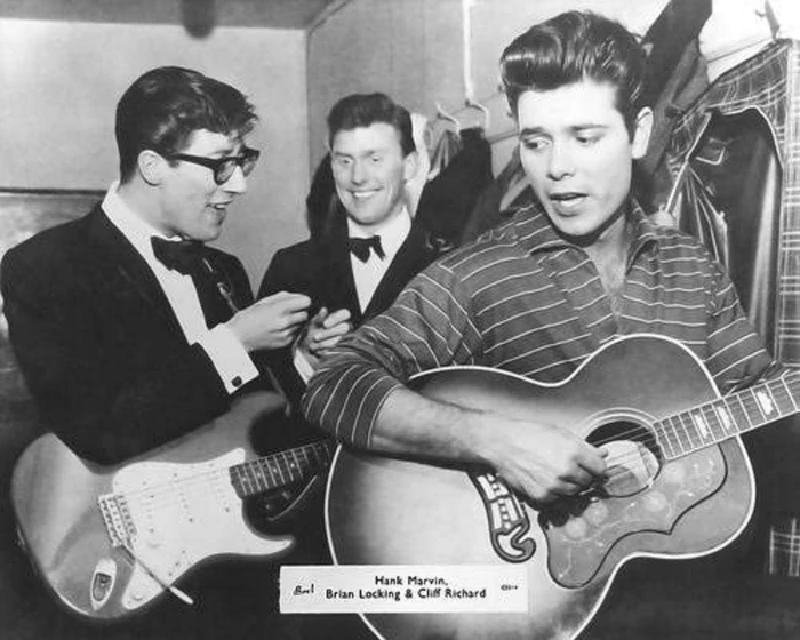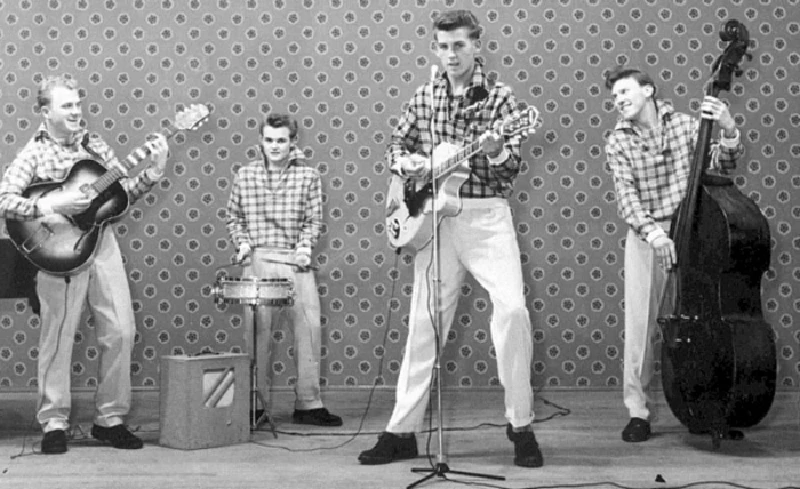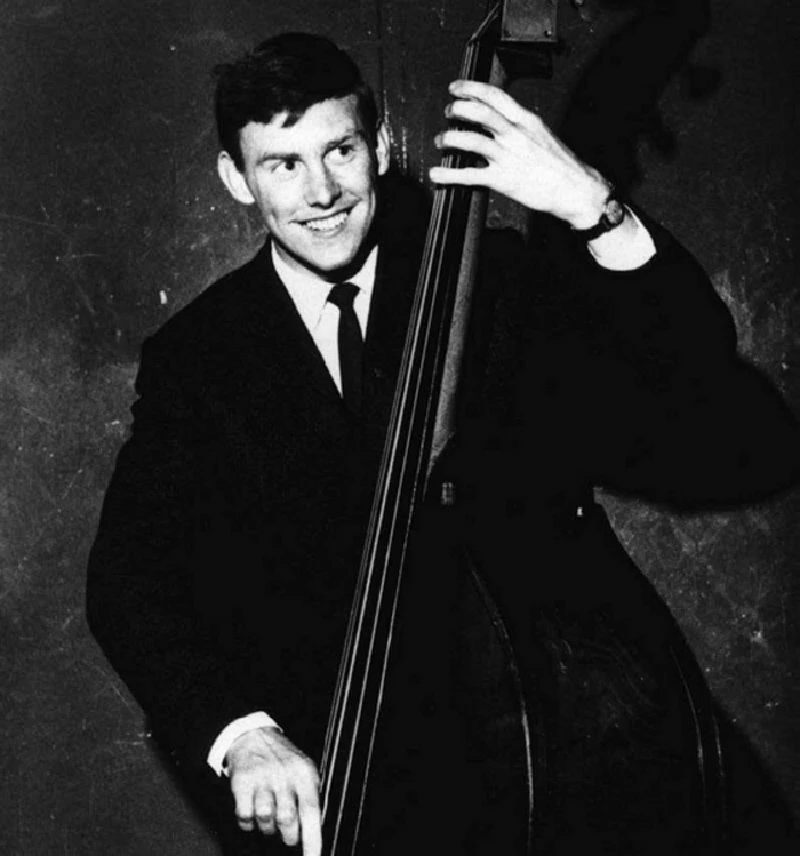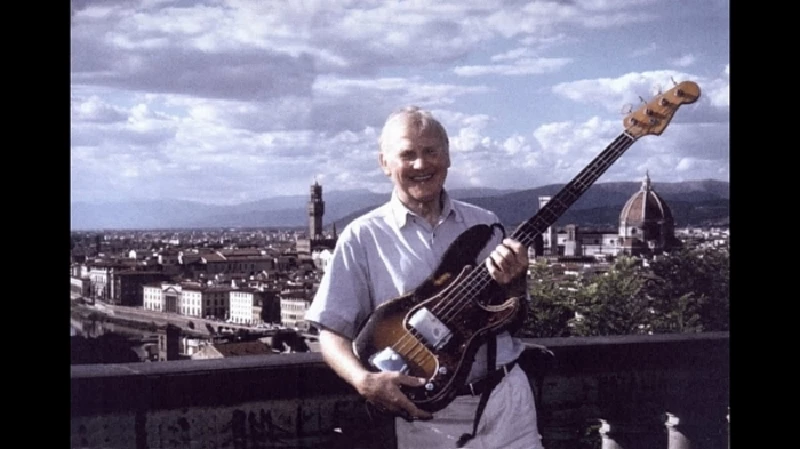Brian Locking - Interview
by Adam Coxon
published: 29 / 10 / 2020

intro
Brian 'Licorice' Locking, one of rock and roll's pioneers, takes Adam Coxon through the highs and lows of his early career, with an all-star supporting cast.
Brian 'Licorice' Locking is an architect of rock and roll - one of the few people who can truly say he was there at the beginning. One of the regular faces at the now legendary 2i's coffee bar in central London, Brian was part of a new and exciting emerging music scene which was about to change the world forever. After picking up a tea chest bass to play with fellow Grantham lad Vince Eager, Brian went onto play with Marty Wilde and rock-and-roll pioneers such as Gene Vincent and Eddie Cochran. He played on the tour that included the last shows Eddie Cochran ever performed. A phone call from his friend Brian Bennett got Brian Locking the job of replacing Jet Harris in the iconic group The Shadows. He went on to play on some of their biggest hits as well as appearing in the film 'Summer Holiday' with Cliff Richard. Pennyblackmusic spoke to Brian at his home in Wales about his iconic career in music and how a chance meeting with a former colleague led to him playing on Donovan's first album. Pennyblackmusic: Your good friend Roy Taylor, who we now know as Vince Eager, gave you the name 'Licorice'. How did that come about? Brian Locking: There was a toy clarinet that we mucked about with at a fair in Boston, in Lincolnshire, on the way to a little gig. We were just mucking about. We were only 17. We were looking for nicknames for each other. I was always gooning about. Roy called me 'Licorice' as a nickname and it stuck. PB: You and Roy Taylor (Vince Eager) grew up together in Grantham? BL: We did. My mate Roy Clark and me were a harmonica duo because we were mad on mouth organs. Then Lonnie Donegan started to come along and we got friendly with Roy Taylor who had a great voice and we formed a trio, The Vagabond Skiffle Group. They gave me a guitar and I couldn't handle that. What they needed was a tea chest bass. Roy found me a tea chest and I used his mum's broom handle with a bit of Post Office string! I got a good sound of it and that's how I became a bass player, in 1956! PB: What kind of dance parties were you playing? BL: We used to go to Nottingham, a place called Bulwell. We used to play at a dance hall there nearly every week and then we used to play in clubs in Grantham. Things like The Liberal Club and sometimes The Granada on a Sunday night. There was a lot of skiffle flying around in those early days. PB: What kind of songs would you be doing at this time? Would it be Lonnie Donegan songs? BL: Yeah, Lonnie Donegan songs. 'Don't You Rock Me Daddy O', 'Cottonfields', a bit of Elvis maybe. Roy would include those. 'Be Bop a Lula' by Gene Vincent. All of those easy sort of numbers. PB: It must have been a very exciting time for you musically. When you were playing 'Be Bop a Lula' with The Vagabond Skiffle Group you couldn't have ever imagined that a couple of years later you'd be playing with Gene Vincent on tour. BL: I got a proper double bass from Lincoln. I bought it. I don't know how I bought it but I bought it! I took it to Roy's house, I couldn't really play it but I was very excited by it. The very first number I'd ever played on it was 'Be Bop a Lula' in the key of C. We were a good band and there was a skiffle competition going on in Nottingham. If you won that competition, you could go to London to go on the television onto the National Skiffle Competition. In those days, it wasn't Strictly Come Dancing, it was called Come Dancing. We won our heat in Nottingham, so we went to London, to the Locarno in Streatham. We got there and there was another band there called The Trent Side Five. I always remember that. They came from Nottingham. There was only three skiffle groups on that really passed the audition and we were one of them. The Trent Side Five, us and another band, 'The Woodcutters', who were from a Jewish orphanage. We came second. While we were there, we were sleeping in the back of the van and Roy said, 'Let's go to the 2i's Coffee Bar' in Soho. We got there and I remember parking up and we had dressed up in our suits. We asked if we could play there, and we played there! The manager was Paul Lincoln, the wrestler. We went home and I got a letter asking if we'd like to go and play down there regularly, so that's what we did. We stayed in a hostel in Paddington, we didn't stay there long. I don't know how we lived and survived. We used to play at the 2i's for just enough money to buy egg and chips. I don't know how we did it but we did it for a while. We got onto a Sunday concert with Marty Wilde in Middlesborough. I think we opened the show. Just after that, Roy got snapped up by Marty Wilde's manager, Larry Parnes. We sort of began parting company from there on. The other two musicians, Roy Clark and Mick McDonagh, were still hawking it down the 2i's Coffee Bar but Roy [Vince Eager] was going in a different direction. It turns out that Mick and Roy, they went home. So that left me on my own. While we were down at the 2i's, there was lots of people that were there. Wee Willie Harris, Tony Sheridan, Tony Harvey, they all used to wander in and play where they could. I was on my own and I said to myself, "I think I'll pack the business in". I couldn't see any future. I was going nowhere, nothing really happened. I'd made a decision to go home the following week. I think it was a Saturday night, I was gazing out of the window at the 2i's and all of a sudden, a taxi turned up. A guy called Henry Ackroyd got out who was something to do with Wee Willie Harris. The big name at the time was a singer called Terry Dene, and he was making a name for himself, he had a good band. He'd just got married and he was coming back from his honeymoon and doing an eight-week tour. The taxi was ticking outside and Henry was looking for me as a replacement bass player. The bass player from Terry Dene's band was ill and couldn't do the tour. So, he was looking for me! That night I went to my digs, got my bass and was on a train to Glasgow. PB: Wow! BL: In the band was Terry Kennedy, Mick McDonagh and the drummer was Clem Cattini. This was around 1958. While I was up in Glasgow, I was the new boy. Terry Kennedy said, "Do you want to come with me to Largs?" I didn't really want to go but I decided to anyway. So we went and we got chatting to this guy outside of the theatre and we decided to go back to the digs to have a cup of tea. We got back to the digs and there was a guy sitting there very quietly having a cup of tea. I said, "Hello mate, my name's Brian". Do you know what he said? "My name's Brian too!" It was Brian Bennett. That's where I first met him. He was finishing his summer season or something like that. I told him my story that I was going to go home but I suppose that I'd end up at the 2i's Coffee Bar. Brian said that he'd see me down there. So we met again at the 2i's and we became great friends, we still are. He was a great drummer for his time. Me and him were jazz-minded, we used to swing like hell. We were regulars down at the 2i's with Tony Sheridan. We became a trio, The Tony Sheridan Trio. It was then that a tall American guy came in the bar in a white raincoat, very tanned, very distinguished. He came in with a lookalike Gene Vincent guy. He told us that he was looking for a group for his friend Vince. Immediately, Tony Harvey, Tony Sheridan, Brian Bennett and myself played Twenty Flight Rock and this guy Vince Taylor sang. And he was good. We did a couple of gigs as Vince Taylor and The Playboys. It was around then that the 'Oh Boy' show was beginning to come up. And so Vince's manager, this American guy, got us onto the 'Oh Boy!' TV show and that's how it happened. PB: That was a really important show at the time, wasn't it? BL: We opened the show actually. We met [legendary television producer] Jack Good. PB: I hear that Jack Good was quite the character. BL: Oh yeah, I mean, he was way ahead of his time. I think we did the show twice. There was Chris Andrews, a young lad, very young with black hair swept back, a Jerry Lee Lewis type player. He wrote a big hit later on called 'Yesterday Man', and this was his debut on 'Oh Boy!'. Jack Good came up to Tony Sheridan, me and Brian and asked us if we would back this lad. He sang 'Move It'. I've got that on video here in the garage. We became the 'The Playboys', and recorded a song with Vince Taylor at Abbey Road called 'Right Behind You Baby'. A real rocker. I think we did it in one take, it was that good. We did that and they wanted to record another number. Tony Sheridan was a little bit unreliable in one way or another. I can say that now. So we got another guitar player in called Joe Moretti. He was the guitar player on 'Shakin' All Over' with Johnny Kidd and The Pirates. So we got him and he was the guitar player on a track called 'Brand New Cadillac' which we did with Vince Taylor. We only recorded four numbers. We did a lot of gigs with Vince Taylor, he was a great artist. Then we met up with Marty Wilde. Marty wanted Brian and me as his Wildcats. Joe Moretti couldn't make it because he was getting work elsewhere with a trumpet player called Eddie Calvert. So we were looking for another guitar player and we found Big Jim Sullivan. That's how he became the lead guitarist of Marty Wilde's Wildcats. PB: And what a great find too! BL: I know! So we found Big Jim and we became great friends. He brought his mate in with him, Tony Belcher. A nice rhythm guitar player. We found a band with Marty and recorded with him: 'A Teenager in Love', 'Sea of Love', 'Bad Boy' and an album. We toured with Marty for about two years. Larry Parnes now managed Billy Fury and there was a rock-and-roll package with Gerry Dorsey - who later became Engelbert Humperdinck - Johnny Gentle, Dickie Pride and all kinds. If we weren't with Marty, we were touring with Billy. That's when the American rock stars started coming over. Gene Vincent and Eddie Cochran. So we were picked to play with Eddie. Gene Vincent topped the bill, and Eddie Cochran and the Wildcats opened the show. PB: It was in the final week of that eight-week tour that tragedy struck. BL: We were taken off the tour for the last week to go for a week with Marty. That's when the other band that backed Gene Vincent at Bristol Hippodrome backed Eddie on the last week of his life. That's when he got killed. PB: One of the last times you saw Eddie Cochran was when you were jamming together in his dressing room? BL: He pulled his chair up and said, "I didn't know you played Harmonica". We played the blues together for about 20 minutes or so. He wanted to include a harmonica duo piece in a future show together but of course it never happened because he died shortly after that. PB: I can't imagine how that must have felt, to lose Eddie. BL: My greatest memory is in the middle of his act, he did a song called 'Hallelujah, I Love Her So'. He did a guitar solo in between. Eddie and I used to stand back to back in the middle of the stage when he played his guitar solo. Every night he always used to say, "Go on, Licorice, go on, man!" I treasured that little spot. It was quite an experience. I remember when I got my first suit in 1956 or 57, going to The Granada in Grantham. There was a film called 'The Girl Can't Help It' and all of these stars were in the film: Eddie Cochran, The Platters, Fats Domino. I remember seeing Eddie doing 'Twenty Flight Rock' with his burnt orange Gretsch guitar. We rehearsed on Gerrard St off Piccadilly, and when we went downstairs, there was Eddie. Very quiet and very polite. He always called you 'sir'. On the floor was this guitar case and that was the thrill of my life. When he opened it up, there was this original burnt orange Gretsch that I saw in the film. I went "Oh my goodness me! What have I let myself in for here!" So we had a rehearsal and our rock-and-roll was swing rock-and-roll. Eddie's wasn't, it was a different rhythm altogether. I must admit, we were rubbish. Eddie taught us a new way of playing. We got it eventually. We did well. PB: What was it that led you to depart from Marty? BL: Marty was in a couple of films and a couple of shows. He was now becoming his own man which left us on our own. We were not called Wildcats from then on, we changed the name to The Krew Kats. We didn't get anywhere. We did some recordings but they didn't go anywhere. It never really took off. Then The Krew Kats disbanded and Brian suggested that there was a job coming up in Great Yarmouth, a summer season. We were required to play in the little pit orchestra. The Windmill Theatre, Yarmouth. We went down there and got the job. Who should be on the bill but Frankie Howerd and Tommy Steele. PB: Did you already know Tommy from the 2i's? BL: No, I never met him in my life. All the time I was down at the 2i's in those early years, Tommy was never there. Anyway, we met up with Tommy and he didn't use the orchestra for his act. There was just Brian, myself and Tommy. Then we did a season at Blackpool. We used to fly from Yarmouth to Blackpool. He actually had an MD as well that knew his act. He used to top the bill in Blackpool and we were in the orchestra pit. We knew his act. After the summer season, Tommy wanted to go on tour. Brian and I were still in the orchestra pit. Of the first week of an eight-week tour with Tommy, that's when there was a big change going on. Tony Meehan of The Shadows left and that was huge news at the time. In 1961, Brian Bennett got that job. I carried on with Tommy and another dummer for quite a time. By this time, Brian was well established in The Shadows. I carried on all through 1961. I did a pantomime season in the pit with Tommy at the Liverpool Empire. And then nothing after that. From January to April, nothing. So again, I thought that I was out of the business. I'd come to the end of the line. Then, all of a sudden, there was a phone call. It was Brian Bennett. He said "Jet Harris is leaving the band. Would you be interested in replacing him?" That shook me rigid. I went for an audition and passed it. So that's how I got back with Brian again. One thing led to another. PB: That must have been a bit of a whirlwind for you. BL: It turned me upside down, to be honest. Jet was this blonde, good-looking, moody guy. Who could replace him? No-one! From then on, it was non-stop. Non-stop. Recording, touring, Abbey Road, the film 'Summer Holiday'. I was on all those recordings. It was done at Borehamwood Studios. Hank Marvin played piano on Bachelor Boy, not many people know that. We all got on very, very well by the way. 'Wonderful Land' was top of the bill at the time I joined. My first recording was 'Guitar Tango' and then 'Theme For Young Lovers'. That was released later but recorded earlier. 'Atlantis', 'Dance On', 'Foot Tapper', 'Granada', I was on all them. We did quite a lot. There was a lot of touring. We toured South Africa and Israel. We went to Barcelona and that's where we met The Beatles. We were at the same hotel. Brian Epstein was there. We swam with them in the swimming pool. Really nice guys. PB: It must have been nice for you guys to meet up with people like that who were of a similar age and having similar experiences of fame? BL: The Beatles were taking over, obviously. The Beatles were going forward and we were going backwards. We did a week on our own. The first time The Shadows went on tour on their own without Cliff was at the Liverpool Empire. We didn't know but Brian Epstein brought The Beatles to watch our show. We always dressed very smart and Brain Epstein said to them, "that's the way you should dress". Maybe that was an influence to them in those early days. We carried on recording and touring. I ended up doing a summer season in Blackpool with Cliff. Then was the tour of Israel and then was the Olympia in Paris where we performed for a week. Then I did my final week with Cliff around October/November of 1963 and then I left. I just slid out of the back door. PB: What was the reason for you leaving the band after just 18 months? BL: Well, I was dedicated. You know I'm one of Jehovah's Witnessess? I was dedicated to that. It had nothing to do with disagreements or anything like that. I needed the freedom. It was a question of dedicated time but it was always conflicting with what I wanted to do. I didn't tell anybody that, I kept it all to myself. I'd made the decision to go. I spoke to Bruce about it and he said, 'Don't say anything to anyone else about it, just keep it under your hat', which I did. Then they let the cat out of the bag when I was in Israel. I met John Rostill who came to Abbey Road. There's a picture of me handing my bass guitar over to him. Everyone was friendly. Nice and happy. No probems whatsoever. No disagreements. Nothing. I treasure the time I had. It was a golden period. I did a number called 'Dakota'. We found 'Dakota' and 'Dance On' on the same day at the bottom of a cupboard, and we used 'Dance On' as the next recording. It was recommended that I played 'Dakota' on the harmonica which I never played onstage actually. I used to play 'Stranger on the Shore' on the harmonica. PB: Before we finish I want to hear about you playing on Donovan's first album. BL: That's interesting really. It's a throwback. This is the link: I lived in South London, near The Oval cricket ground. I went downstairs on the Tube and who should be down there, the guy that used to be the lead guitar player with Terry Dene. We bumped into each other and he asked if I still played my double bass and I said I did. He said, "Would you like to do a recording in New Bond Street? There will only be three of us." I took my bass down there and there was a very bohemian looking guy with a drum kit that was held together by sellotape. His name was Gypsy Dave. Terry Kennedy, the guy I'd met in the Tube, was managing Donovan. He walked in, this young lad with a blue cap and black curly hair. God, he was good! We did, 'Colours', 'Catch The Wind', and 'Mr Tambourine Man'. PB: Thank you.
Band Links:-
https://en.wikipedia.org/wiki/Brian_LockingPlay in YouTube:-
Picture Gallery:-



most viewed articles
current edition
Carl Ewens - David Bowie 1964 to 1982 On Track: Every Album, Every SongArmory Show - Interview with Richard Jobson
John McKay - Interview
Colin Blunstone - Thalia Hall, Chicago, 16/7/2025
Bathers - Photoscapes 1
Billie Eilish - O2 Arena, London, 10/7/2025
Loft - Interview
Visor Fest - Valencia, Spain, 26/9/2025...27/9/2025
Sir Tim Rice - Interview
Robert Forster - Interview
previous editions
Manic Street Preachers - (Gig of a Lifetime) Millennium Stadium, Cardiff, December 1999Heavenly - P.U.N.K. Girl EP
Beautiful South - Ten Songs That Made Me Love...
Oasis - Oasis, Earl's Court, London, 1995
Peter Perrett - In Dreams Begin Responsibilities Interview Part One
Boomtown Rats - Ten Songs That Made Me Love....
Coldplay - Wembley Arena. London, 16/8/2022
Prolapse - Interview
Pixies - Ten Songs That Made Me Love...
Trudie Myerscough-Harris - Interview
most viewed reviews
current edition
Davey Woodward - Mumbo in the JumboSick Man of Europe - The Sick Man of Europe
Lucy Spraggan - Other Sides of the Moon
Amy Macdonald - Is This What You've Been Waiting For?
Phew, Erika Kobayashi,, Dieter Moebius - Radium Girls
Suzanne Vega - Flying With Angels
Bush - I Beat Loneliness
Alice Cooper - The Revenge of Alice Cooper
Cynthia Erivo - I Forgive You
Blueboy - 2
Pennyblackmusic Regular Contributors
Adrian Janes
Amanda J. Window
Andrew Twambley
Anthony Dhanendran
Benjamin Howarth
Cila Warncke
Daniel Cressey
Darren Aston
Dastardly
Dave Goodwin
Denzil Watson
Dominic B. Simpson
Eoghan Lyng
Fiona Hutchings
Harry Sherriff
Helen Tipping
Jamie Rowland
John Clarkson
Julie Cruickshank
Kimberly Bright
Lisa Torem
Maarten Schiethart